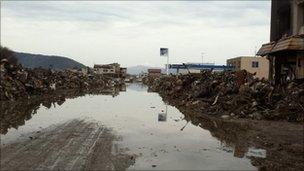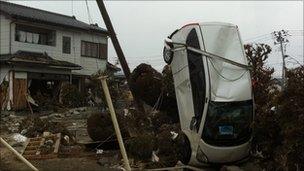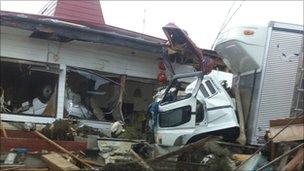Scottish teacher tells of Japan earthquake aftermath
- Published

The remains of Ishinomaki near Sendai, Japan
Neil Slorach, 30, from Milngavie, Glasgow, has lived in Japan for four years and teaches English to children.
For the last two years he has been a resident in Sendai, among the worst affected areas by the earthquake and tsunami earlier this month.
Here Neil tells of his experiences.
From the moment the earthquake struck everything changed.
I rushed outside as soon as the shaking stopped, glad that my building hadn't fallen down. I stood outside in a t-shirt with snow starting to fall.
The streets were filled with people rushing to get to their homes and people cramming into local newsagents to buy up as much as they could before the shops closed their doors.
Crowds thronged the streets, afraid to go indoors because of the constant aftershocks occurring every five to 10 minutes.
With the night coming and no power for street lighting they eventually had to venture back in as they wanted to start cleaning their homes.
'Dark ages'
Not much sleep was had that night and the night time was strange and eerie, with pitch blackness and silence outside.
Sitting at home with candles re-reading books, unable to contact family or friends, I felt as if Japan had been thrown into the dark ages.
For the following week the majority of people were without power or water and some were also without gas. I was without power and water but luckily I had gas due to my supply being fed from a canister outside my apartment.
With transport ground to a halt, and no shops open at all, most of the week consisted of taking a walk outside to see the damage, returning home to cook what little food I had and lighting my candles. Some supermarkets began to open for a limited time, with the amount each person could buy strictly limited.
If, however, you wanted to get into the supermarkets you had to wait in line for at least two to three hours. Once inside there was next to nothing left which is still pretty much the case as I write this.
Set limits as to how much each person can buy in certain shops are still in place. Most supermarkets have very little in the way of fresh food and nearly no liquids, with bottles of water in very short supply.

Depression is a real danger as so many people now have no house, no job and no possessions
The majority of petrol stations are closed. This is also the case for the suppliers of the gas people use in their homes, with people being told they may have to wait for up to a month for supplies to return. Still, we know we are lucky.
Television channels carry endless coverage of the mounting number of dead and missing, along with story after heartbreaking story of people searching for loved ones among the wreckage of what were once busy towns.
These people, along with the extraordinary number living in the shelters are the ones who most need help.
From seeing these areas and speaking to Japanese friends, I know there are many people who are trying their best to remain positive about a very dire situation, but there are also many who are not coping as well.
'Living hell'
Every day the main Sendai city broadsheet publishes a full page, sectioned into different areas of Tohoku, detailing the names of the dead and the missing. With each day bringing a new page of names it is a very sobering sight.
In their own words these people are in a living hell. Many don't want to face the reality of what has happened and are at the moment living from meal to meal and not thinking about the future.
They feel like giving up because as far as they can tell there is no hope. Depression is a real danger at the moment as so many people now have no house, no job and no possessions.
Many police forces have already had to intervene in suicide attempts and are being extra vigilant for anyone else who maybe considering it. Community groups are advising people not to be alone if possible, as another measure to ensure that people don't do anything that would put their life in danger.
Even though it is difficult for most at the moment it is even more so for the people who are living at the shelters.
They are in desperate need of essential supplies like underwear, toothpaste and toothbrushes, medicine and also nappies for the many babies and toddlers who are there, and of course food and water. These areas are now devoid of any outlet where they can buy basic supplies.

The destruction has meant many people are living in shelters where they are in need of basic supplies
When deliveries do arrive in some areas the people are told to stand about 10 metres back before a whistle is blown which allows them to run forward and grab what they can. It is first come, first served.
One Japanese friend described it as being as if the people had gone wild. For the orderly, disciplined Japanese this is a very painful experience.
The older generation of people who are at the shelters are also having great difficulty. There is a lack of appropriate medicines for existing conditions, such as diabetes and heart conditions, and also for newly occurring problems.
'In desperate need'
With people living in such close proximity with inadequate sanitation, the chance of illness spreading is increased.
They are unable to move around, unable to get any exercise and spend most of their time sitting down confined to a small area on the floor of a cold gym or community hall.
Some of them feel they aren't getting enough information with only small radios available for use among many people.
Outside the shelters in some areas many people have been camping even if their houses are still standing. This is again due to lack of basic necessities. There is no power, no food, no water and no gas, so people have been camping at the shelters in order to be fed.
I wanted to write this article to highlight the plight and suffering of so many of the people here in north eastern Japan. They are in desperate need of so many basic things and I only hope to help in any way possible. Please don't allow these people to be forgotten.